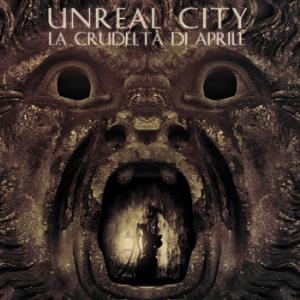It's kind of odd. I wanted – want – to move away from the seventies and was checking out a band called Moongarden, then I find they're not really considered RPI, although they are Italian. So what is it about Rock Progressivo Italiano that makes it what it is? I assumed – apparently wrongly – that to be an RPI band you simply had to play prog rock and come from Italy, but that does not now appear to be the case. Well, returning to my other go-to source, progarchives.com, I read that RPI is not so much a genre or even a country-based phenomena (although you can't be an RPI band without being Italian; however just simply being an Italian prog band does not make you RPI. Huh?) but a way of thinking, playing, composing and paying your musical dues back to your seventies forebears. One writer compares the emergence of RPI to the Renaissance, when fifteenth-century Italy led the way in a resurgence in culture, art, literature and thinking as the Dark Ages receded.
So then I thought, well to be RPI you must be a band playing in, or at least formed in, the heyday of Italian prog, ie the seventies. But no: this band were only formed in 2008, and yet are supposedly accepted as being Rock Progressivo Italiano as much as PFM or Banco. I'm going to be reading up more on this idea, but for now I have from Progarchives a list of bands who most assuredly are considered RPI, and from this list I have plucked
 La Crudeltà di Aprile – Unreal City – 2013 (MRL)
La Crudeltà di Aprile – Unreal City – 2013 (MRL)
Although he is not in the band, my good buddy Fabio Zuffanti, whom I mentioned at the beginning of this article, he who helms Hostsonaten among others, is credited with being the artistic director of this new band, whatever that may mean. It seems to be the baby of Emanuele Tarasconi though, as he sings and plays the keys (and there are a lot of them), while Francseca Zanetta is something of a rarity, not only in being a lady in prog but also the guitarist, and the hilariously-named Francesco Orefice

looks after bass duties. Although they only formed in the twenty-first century it seems Unreal City are afforded the tag of RPI due to their adherence to the old values of bands like PFM and Banco, and indeed are credited here (whether officially or not I don't know) with the extra tag of “modern PFI”. Hmm. This is their debut album, and it seems to have been quite well received. Good boppy start to “dell'innocenza perduta”, some fine organ and piano, vocals then come in around the second minute as the tune settles down into a nice relaxed piano run, and the singing itself is very pleasant. Not a clue what he's singing about of course, but nice to listen to. Picking up speed now in the fifth minute, crazy piano and organ run and some thundering drums from Federico Bedostri. Sounds like a fiddle there at the end. Could be; these guys seem to use a whole lot of instruments, including, I see, a Renaissance lute! Well, I see there's a guest appearance by Fabio Biale on the violin, so I guess that's him.
It's a fine guitar that gets “Atlantis (Conferendis Pecuniis)” underway, sort of a dark feeling to it, then it picks up nicely about halfway through, before falling into a sort of medieval folk thing. I guess that could be the Renaissance lute they were talking about. And the reliable old church organ heralds our descent into Hell, or “Catabasi (descenscio ad infernos)” with pealing bells and then a dark synth. In places this reminds me very much of Arena. Suddenly then that violin/fiddle is back, jumping the pace and bringing some light into the netherworld. “Dove La Luce È Più Intensa” has a powerful instrumental opening, which goes on for a minute and a half of the seven it runs for, while “Ecate (Walpurgusnacht)” opens on a beautiful classical piano line with attendant synth with some funky percussion and organ, and a sort of mix of reggae and blues, if you can imagine such a thing.
The epic though is the closer, “Horror vacui”, which runs for almost eighteen minutes and is split into four different sections. Opening on “Le radici del mare”, it's a soft, gradual introduction to the piece as it slowly coalesces on soft piano and bassy piano before warbling synth joins in as the rhythm section makes itself heard, and I'm going to assume the first part is an instrumental intro, as otherwise I have no breakdown of the suite and therefore no idea where one section ends and another begins. The vocals then bring in a more jaunty, upbeat tempo as “L'assassino” (yeah, who can translate that?) begins, but unless it's very obvious, I have no idea where this will move into part three. Nice keyboard solo in the tenth minute, could be part three, but no way to know for sure. Some lovely smooth fretless bass too. Powerful, almost jazzy at times, instrumental ending.
Track listing
1. Dell'innocenzo perduta
2. Atlantai (Conferendis pecuniis)
3. Catabasi (descenscio ad infernos)
4. Dove La Luce È Più Intensa
5. Ecate (Walpurgisnacht)
6. Horror vacui
(i) La radici del mare
(ii) L'assassino
(iii) Nel sonno della ragione
(iv) Il baratro della follia
And another great Italian prog album, proving I guess that you didn't have to be recording in the seventies to be an RPI band. Unreal City certainly have an advantage though, as they are under the wing of Zuffanti, who has been playing and composing and producing music since the mid-nineties and certainly knows his way around the scene. A real case, I think, of “stick with me, boys, and I'll make stars out of you.” They've made a very good start with this debut.